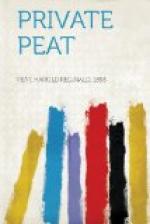Our shift in the trenches was supposed to be four days and four nights in. It never was shorter, sometimes much longer. Once we spent eleven days and nights in the trenches without a shift, because our reinforcing battalion was called away to another sector of the front. I know of a Highland Battalion that was in twenty-eight days and nights without a change.
We were unequipped as to uniform. We were in the regulation khaki of other days. We had no waterproof overcoats. We had puttees, but the greater number of us had no rubber boots. A very few of the men had boots of rubber that reached to the knees. At first we envied the possessors of these, but not for long. The water and mud, and shortly the blood, rose above the top and ran down inside the leg of the boot. The wearers could not remove the mud, and trench feet, frost bite, gangrene, was their immediate portion. We lost as many men, that first winter of the war, by these terrible afflictions as we did by actual bullets and shell fire.
To us who had come from the Far Northwest the weather was a terrible trial. Our winters were possibly more severe, but we could stand them so much better, with their sharp dry cold in contrast to the damp, misty, soaking chill of this non-zero country. Possibly, at night, the thermometer would register some two or three degrees below freezing. A thin shell of ice would form on the ditch which we called a trench. This would crackle round our legs and the cold would eat into the very bone. At dawn the ice would begin to break up and a steady sleet begin to fall. Later the sleet would turn to rain, and so the day would pass till we were soaked through to the skin. At night the frost would come again and stiffen our clothes to our tortured bodies, next day another thaw and rain, and so to the end of our turn, or to the time when an enemy bullet would finish our physical suffering.
We could have borne all this without a murmur, and did bear it in a silence that was grim, but we had a greater strain, a mental one, with which to contend. We knew—we knew without a doubt that we were out there alone. We had not a reserve behind us. We had not a tithe of the gun power which we should have had. Our artillery was not appreciable in quantity. What there was of it was effective, but as compared to the enemy gun power we were nowhere. They had possibly ten to our one. They were very considerably stronger than they are to-day. We, to-day, can say with truth that we are where they were in 1914-15. We, with our two years of hurried and almost frenzied work, and they, with their forty years of crafty preparation!




